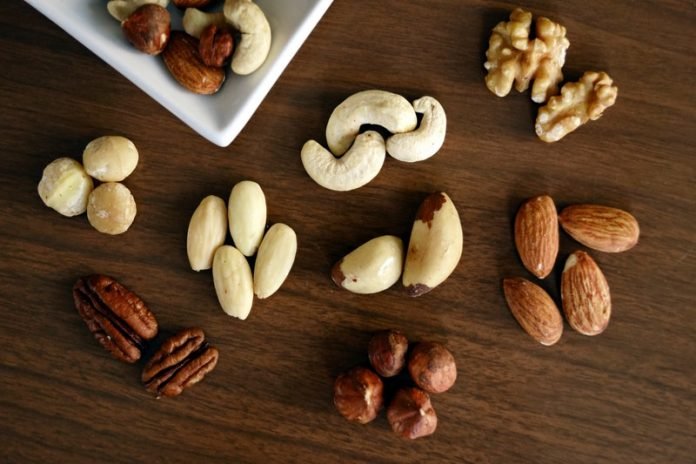
In a new study, researchers found increasing nut consumption by just half a serving (14 g or ½ oz) a day is linked to less weight gain and a lower risk of obesity.
They suggest substituting unhealthy foods, such as processed meats, French fries, and crisps (potato chips) with a half a serving of nuts may be a simple strategy to prevent weight gain when people get older.
On average, US adults pile on 1lb or nearly half a kilo every year.
Gaining 2.5-10 kilos in weight is linked to a much greater risk of heart disease/stroke and diabetes.
Nuts are rich in healthy unsaturated fats, vitamins, minerals, and fiber, but they are calorie-dense, so often not thought of as good for weight control.
But emerging evidence suggests that the quality of what’s eaten may be as important as the quantity.
Amid modest increases in average nut consumption in the US over the past two decades, the researchers wanted to find out if these changes might affect weight control.
They analyzed information on weight, diet and physical activity in three groups of people: 51,529 male health professionals; 121,700 nurses, aged 35 to 55 when recruited to the Nurses Health Study (NHS); and 116,686 nurses, aged 24 to 44 when enrolled in the Nurses Health Study II (NHS II).
Over more than 20 years of monitoring, these participants were asked every 4 years to state their weight, and how often, over the preceding year they had eaten a serving (28 g or 1 oz) of nuts, including peanuts and peanut butter.
Average weekly exercise— walking, jogging, cycling, swimming, racquet sports, and gardening—was assessed every two years by questionnaire.
The team found increasing the eating of any type of nut was linked to less long term weight gain and a lower risk of becoming obese, overall.
Increasing nut consumption by half a serving a day was linked to a lower risk of putting on 2 or more kilos over any 4 year period.
And a daily half serving increase in walnut consumption was linked to a 15% lower risk of obesity.
The team also found that substituting processed meats, refined grains, or desserts, including chocolates, pastries, pies, and donuts, for half a serving of nuts was associated with staving off weight gain of between 0.41 and 0.70 kg in any 4 year period.
Within any 4 year period, upping daily nut consumption from none to at least half a serving was linked to staving off 0.74 kg in weight, a lower risk of moderate weight gain, and a 16% lower risk of obesity, compared with not eating any nuts.
And a consistently higher nut intake of at least half a serving a day was linked to a 23% lower risk of putting on 5 or more kilos and of becoming obese over the same timeframe.
No such associations were observed for increases in peanut butter intake.
The team says chewing nuts takes some effort, leaving less energy for eating other things, while the high fiber content of nuts can delay stomach emptying so making a person feel sated and full for longer.
Nut fiber also binds well to fats in the gut, meaning that more calories are excreted.
And there is some evidence that the high unsaturated fat content of nuts increases resting energy expenditure, which may also help to stave off weight gain.
The researchers suggest snacking on a handful of nuts rather than biscuits or crisps may help to ward off the weight gain that often accompanies aging and is a relatively manageable way of helping to curb the onset of obesity.
The study is published in the journal BMJ Nutrition, Prevention & Health.
Copyright © 2019 Knowridge Science Report. All rights reserved.



